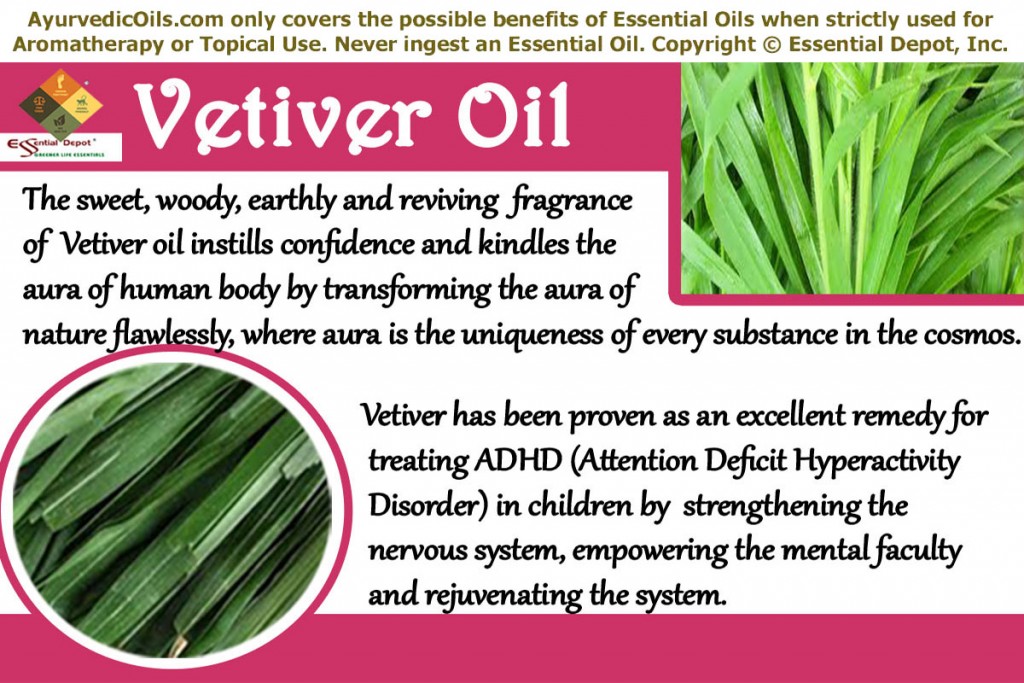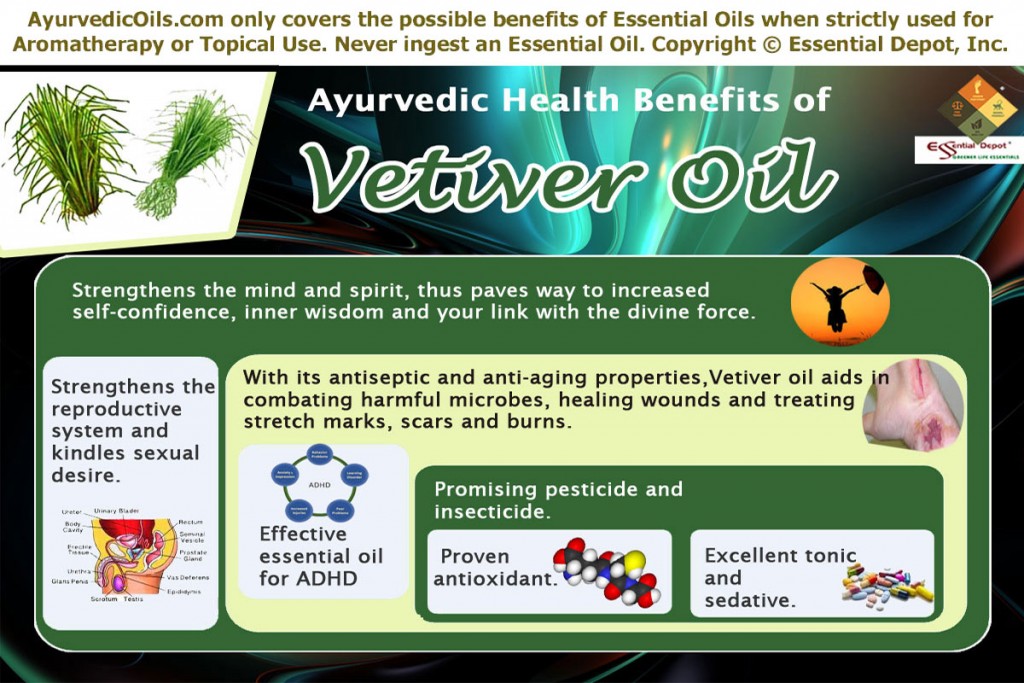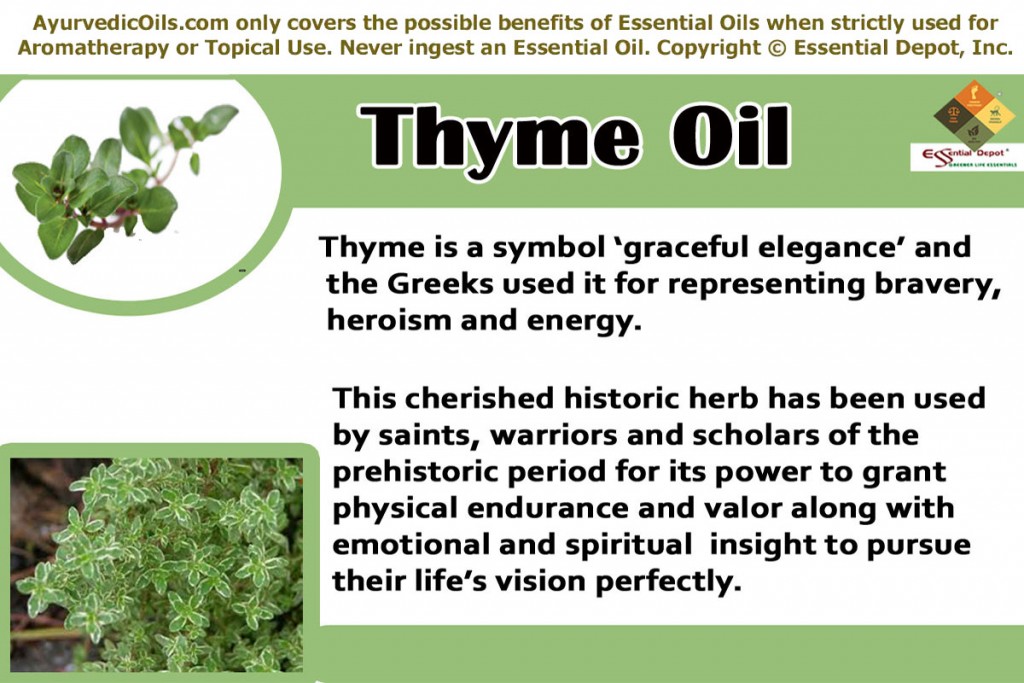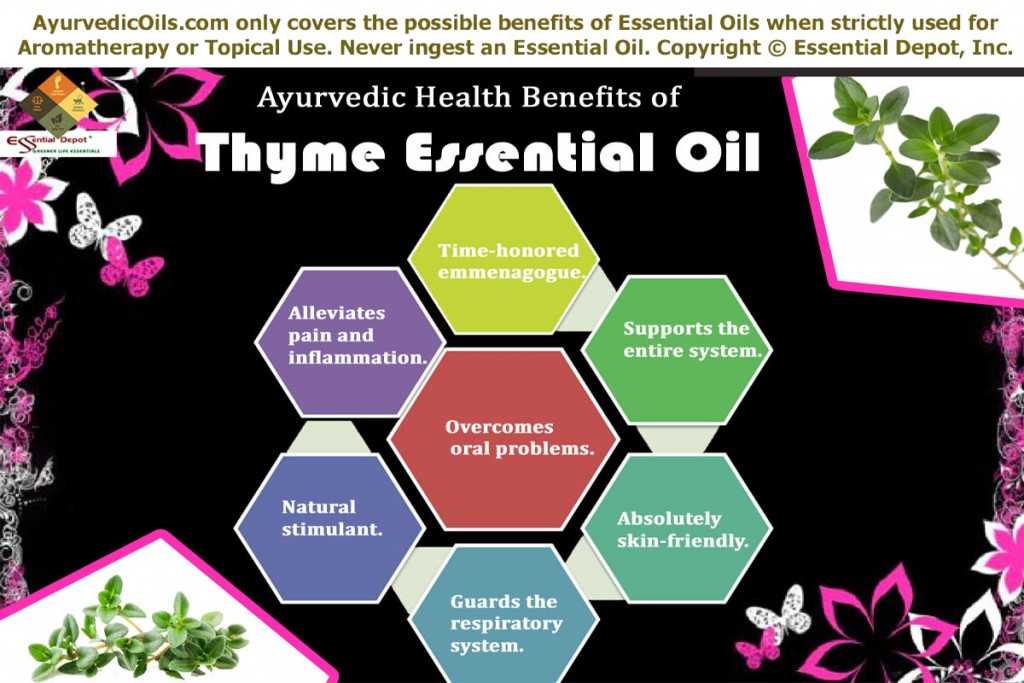 Vetiver is a holy herb that has its name etched in the oldest sacred book of Hindus known as Bhagavad Gita where Lord Krishna says, “I am the fragrance of the soil“. This reminds us about the universal truth that the Creator is present in all creatures born on the planet Earth and is nurtured by the rich flavors of Mother Nature.
Vetiver is a holy herb that has its name etched in the oldest sacred book of Hindus known as Bhagavad Gita where Lord Krishna says, “I am the fragrance of the soil“. This reminds us about the universal truth that the Creator is present in all creatures born on the planet Earth and is nurtured by the rich flavors of Mother Nature.
Vetiver is an aromatic grass that grows up to a height of six feet and the essential oil of Vetiver is extracted from the roots of this mythological herb.
The sweet, woody, earthly and reviving fragrance of this natural oil instills confidence and kindles the aura of human body by transforming the aura of nature flawlessly, where aura is the uniqueness or radiation of every substance in the cosmos.
Ayurveda is the oldest of all healing practices that celebrates the therapeutic values of Vetiver essential oil by attributing its divine aroma and curative properties in the treatment of innumerable health conditions. Come let’s love learning the magic of Vetiver essential oil.
Purchase Vetiver Essential Oil – Wholesale – CLICK HERE
Historical uses of Vetiver and its essential oil:
The history of Vetiver backs to the 12th century. Vetiver herb and its essential oil have been in use in many cultures across the globe for thousands of years together. The massive use of this sacred herb is often attributed to its uplifting, soothing, healing, calming and shielding properties. Vetiver oil is known as the ‘Oil of tranquility’ in India and Sri Lanka.
Ayurvedic treatments involved the use of this oil to treat the imbalances of an individual’s constitution and to heal health disorders like muscular aches, fevers, arthritis pain, loss of energy, heat strokes, joint disorders, skin problems, headaches and to cool the body during extremely high temperatures. Vetiver essential oil was used in massaging brides to sanctify them before their marriage.
The comforting, deep, woody, earthy and distinct aroma of this oil has made it a strict masculine fragrance in the perfume industry. The most popular use of Vetiver oil in the Middle Ages is its use in scents along with lime and rosewood.
Ancient Chinese believed that Vetiver essential oil had high calmative powers that cool the system, energize the brain cells, stabilize emotions, invigorate dry skin and pacify hurtful thoughts and anger.
Vetiver oil was recommended even for patients suffering from Yin deficiency often ending up in dissociative state of depression. For all these special reasons it was used as an aid for meditation and other problems related to the mind.
The cooling property of Vetiver herb made its use inevitable to bring in the natural freshness and coolness especially during hot summer seasons. Vetiver roots were used as a substitute to straw or wood shaving pads in evaporative coolers. Muslin sachets with Vetiver roots are put in earthen water pots to cool the drinking water naturally and to retain its medicinal values.
Mats weaved with Vetiver roots are trusted to cool, protect and refresh Indian homes during scorching summer season. Gods and idols in India are honored with garlands made of Vetiver grass.
This grass is also used in making roof thatches and Africans used this grass in making rugs, baskets and certain other parts of their homes. The tenacious root system of this plant helped in preventing soil erosion and protecting the fertility of the soil.
Ayurvedic health benefits of Vetiver essential oil:
According to Ayurveda, every living thing on this earth takes up the life energy known as prana and the nutritive essence known as ojas from earth. Plants take up prana and ojas from soil and convert it into medicines, foods and essential oils for the use of other living organisms on earth.
Among all the plant varieties on the universe, the best one to incarcerate the fine intricacies of the earth’s mystifying aroma is Vetiver.
Commonly known as Khus in India, Vetiver has come a long way from a cooling herb to a vital ingredient in thousands of contemporary perfumes and the base for all these evolutions is its miraculous medicinal values celebrated in the world of Ayurvedic medicine.
Ayurveda is a holistic approach that considers human body as a temple where the soul unites with the Creator and trusts that this union is the underlying reason for good health. According to this miraculous science every human being has three distinct doshas among which one dosha stays predominant and this decides the character and persona of an individual. They are vata, pitta and kapha.
The imbalance of any one of these doshas causes illness and indicates that the body is out of balance. Vata imbalance can cause insomnia, loss of memory, fever, dry skin, constipation, restlessness and fear. Pitta imbalance might cause anger, high blood pressure, disgust, heartburn, ulcer, jealousy and skin irritation. Lethargic attitude, congestion, delayed digestion, sluggishness and obesity are caused by Kapha imbalance.
Ayurvedic texts exclaim Vetiver essential oil as a pacifying oil with its relaxing effects for treating vata imbalances and calming the mind. It is also said that the cooling properties of this oil can be highly beneficial in treating pitta imbalances like anger, heartburn and much more.
The historical healing practices and priceless medicinal values of Vetiver essential oil has made it a principal part of Abhyanga or the Ayurvedic massage therapy that is trusted to strengthen the nervous system, calm the nerves, soothe the senses, work against stress and exhaustion.
The other major Ayurvedic health benefits of Vetiver essential oil are: 1. Benefits the mind and spirit:
1. Benefits the mind and spirit:
Vetiver essential oil is used as an anointing oil or incense since the primordial times. It is considered as a sacred oil that has the potential to open the crown and root chakras where chakra is considered as the vital center of power of the human body according to Ayurveda. Among the seven basic chakras, the oil of Vetiver is trusted to kindle the root chakra and pass the vital energy to other chakras also.
The evolution of each chakra has direct connection to the spiritual qualities of an individual and opening up of chakras paves way to mental consciousness and greater spiritual insight. With this awareness, your mind and spirit strives hard in fighting agonizing stress, deep depression, negative energies that drive you hard and your attachment to misleading worldly pleasures.
Applying 1 to 2 drops of Vetiver essential oil on the Chakra points or using it in a diffuser or inhaling its balancing aroma benefits the mind and spirit paving way to increased self-confidence, inner wisdom and your link with the divine force.
2. Benefits for the skin:
With its promising antiseptic properties, vetiver essential oil has been proven effective in combating bacteria and other harmful microbes. It stops wounds and other skin infections from being septic and it efficaciously curbs the growth of the Staphylococcus Aureus bacteria that is often accountable for causing septic.
This oil helps in healing the wounds quickly and promotes the growth of new tissues on the affected area by protecting it from the effects of harmful foreign bodies. In the book Encyclopedia of herbal remedies, Shealy says that vetiver oil “helps to clear acne, and because it promotes skin regeneration and strengthens the connective tissue, it assists with wound healing and benefits aging skin.”
Vetiver essential oil is an established cicatrisant that aids in speeding up the process of treating scars and other ugly marks. It rejuvenates the skin and often gives you a young and healthy look. The anti-aging benefits and the cell regeneration properties of this oil makes it an effective natural remedy for treating stretch marks, acne, burns, fat cracks and certain other skin disorders.
3. Effective essential oil for ADHD:
Attention Deficit Hyperactivity Disorder is a health condition that is generally associated with children and it usually starts before the age of seven and persists throughout the life. Reports say that about 4 to 6 percent of Americans are affected by ADHD. This arises when an individual is excessively diverted, agitated and impetuous for more than six months.
ADHD drastically affects the routine life and the best way to treat it is by using therapeutic oils like Vetiver essential oil. Dr. Terry Friedman in his study about the effects of essential oils on ADHD and ADD compared the efficiency of Cedarwood, vetiver and lavender essential oil. He proved that inhaling the aroma of Vetiver essential oil was 100% effective in improving the performance of children affected by ADHD with its extremely tranquilizing and calming properties, whereas Cedarwood oil contributed to 83% and Lavender oil contributed to 53% improvement.
4. Excellent tonic and sedative:
Vetiver essential oil has been traditionally used for alleviating emotional stress, nervousness, panic attacks, trauma, anxiety, insomnia, hysteria, debility and depression. The sedative, strengthening, tonic and nervine properties of this oil make it the perfect natural choice for assisting problems associated with the mind.
It stabilizes the mind, strengthens the nervous system, tranquilizes the mind and body, rejuvenates the entire system, boosts the immune power and induces peaceful sleep.
Adding few drops of Vetiver oil to carrier oils like Grape seed oil or Coconut oil for an enlivening massage can grant you great relief from all these conditions. You can also add 3 to 4 drops of Vetiver oil to warm bathing water and bathing in this medicated water before sleep will relax your muscles, reduce pain and help you sleep tight.
5. Proven antioxidant: The essential oil of Vetiver was proved to possess “a strong free radical scavenging activity when compared to standard antioxidants such as butylated hydroxytoluene (BHT) and alpha-tocopherol”, according to a research by the Clemson University.
This study reinstated that the inherent components of Vetiver essential oil can be an eventual alternative natural antioxidant. Another study on “Antioxidant potential of the root of Vetiveria zizanioides” evidenced that the essential oil extracted from Vetiver root has been proven to have antioxidant activity and can fight against the free radicals in the body.
6. Promising pesticide and insecticide:
Apart from benefitting mankind in a number of ways, vetiver oil is also an effective pesticide, insecticide and has antitermitic properties. A study on the Chemical analysis and Comparison of Antitermitic activity of essential oils of Neem, Vetiver and Mint against Heterotermes indicola from Pakistan proved that Vetiver oil was the most efficient repellent and valuable fumigent with its long lasting activity and has 60% potential to kill Heterotermes indicola, while mint and neem oil showed 56.66% and 54% effectiveness. Another study proved the Larvicidal property of Vetiver essential oil and its power against the control of mosquito larvae responsible for Mosquito-borne diseases like dengue, malaria, yellow fever and filariasis.
7. Strengthens the reproductive system and kindles sexual desire:
Vetiver essential oil is a natural aphrodisiac that increases libido and stimulates the sexual desire. Healthy and harmonious sex often has a deep connection with state of mind. A stress-free mind is the most vital requirement for sexual health and sexual disorders like frigidity, impotence, lack of libido are often vested with the limbic system of the brain.
Vetiver essential oil stimulates the limbic system, pacifies the mind and serves as an effective natural remedy for such health disorders. This oil strengthens the female reproductive system, aids in treating menstrual discomforts, balances female hormones and assists female infertility due to uterine problems with its gentle estrogen-like effects. Adding few drops of Vetiver essential oil to your massage blend, in a diffuser or your bath tub can help bring the best times together with your partner.
According to Shealy, the most invigorating recipe for a tranquilizing bath is to “add 2 drops of vetiver (oil), 2 drops of lavender (oil), 4 drops of rose (oil) to 2 teaspoons (10 ml) of sweet almond oil. Add to a running bath and disperse with your hands. Relax for at least 10 minutes”.
Vetiver essential oil is also known to promote oxygen, fortify the red blood cells and support blood circulation. It is also used as a warm pain-relieving oil to treat muscular pains, stiffness, arthritis, rheumatism, sprains and few other inflammatory conditions.
For all these medicinal values, vetiver oil is a part of the favorite massage oils like Ortho Sport and Ortho Ease. Vetiver essential oil is also used as flavoring oil in beverages and certain food items. It is also used in cosmetics, soaps and celebrated perfumes like Guerlain Vetiver and Dior Eau Sauvage and the amazing information is that it is used in 90 percent of every western perfume.
Disclaimer:
Vetiver essential oil is non-toxic and non-irritant but avoid taking this oil internally. Consult your Ayurvedic Practitioner before using it directly on your skin. It is good to keep away from the use of this oil on children, pregnant women and pets.
Thought for the day:
Healing is a matter of time, but it is sometimes also a matter of opportunity. -Hippocrates
Suggested Reading:
- The Illustrated Encyclopedia of Healing Remedies by C. Norman Shealy
- HEALING POWERS OF VETIVER OIL (The Aromatherapy Professional: Healing with Essential Oils by KG Stiles
- The Illustrated Encyclopedia of Essential Oils: The Complete Guide to the Use of Oils in Aromatherapy & Herbalism by Julia Lawless
- Vetiveria: The Genus Vetiveria (Medicinal and Aromatic Plants – Industrial Profiles) From CRC Press
- The ADD / ADHD Revolution: Treatments That Work by LaVonne Kirkpatrick
Reference Links:
- Chrysopogon zizanioides by Wikipedia
- The Utilization of Vetiver as Medicinal and Aromatic Plants with Special Reference to Thailand By Narong Chomchalow
- Evaluation of antioxidant activity of vetiver (Vetiveria zizanioides L.) oil and identification of its antioxidant constituents by PubMed
- LARVICIDAL PROPERTY OF VETIVER ESSENTIAL OIL (VETIVERIA ZIZANOIDES. L) AGAINST CULEX TRITAENIORHYNCHUS (DIPTERA: CULICIDAE) by International Journal Of Current Science And Technology


